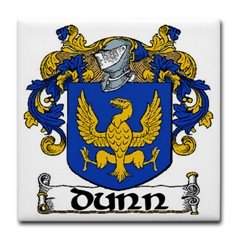
William Edward Dunn (1861-1908) married Josephine Barbara Lauer. Her parents, Casper and Emma Schwarz Lauer, emigrated from Germany to the United States in 1853 and became the great grandparents of WIlliam Edward (Bill) Dunn (1918-1986). Their stories are covered elsewhere in this blog, and below is a "snapshot" of the origin and history of the Lauer surname.
"This surname was a German unflattering nickname for a crafty or cunning person, and was originally derived from the Old German word LURE. It was also occasionally used as an occupational name for a tanner, and a German habitational name from LAUER in Franconia, named from the stream on which it stands.
It was also a French topographic name for someone who lived by a conspicuous laurel tree. The name was originally rendered in medieval documents in the Latin form LAURUS. The name was borne by various minor saints, including a hermit, a martyr and an abbot.
The name is also spelt LAURE, LAURE, LAURO, LAURIER and LAURAS. The earliest French hereditary surnames are found in the 12th century, at more or less the same time as they arose in England, but they are by no means common before the 13th century, and it was not until the 15th century that they stabilized to any great extent; before then a surname might be handed down for two or three generations, but then abandoned in favour of another.
In the south, many French surnames have come in from Italy over the centuries, and in Northern France, Germanic influence can often be detected. The first hereditary surnames on German soil are found in the second half of the 12th century, slightly later than in England and France. However, it was not until the 16th century that they became stabilized.
The practice of adopting hereditary surnames began in the southern areas of Germany, and gradually spread northwards during the Middle Ages.
A notable member of this name was Max von LAUE, (l879 - l960) German physicist, born near Koblenz. He was professor at Zurich, Frankfurt and Berlin. He did good work in relativity, predicted that X-rays would be diffracted by a crystal, and won the Nobel prize for physics in l9l4. He was later appointed director of the Kaiser Wilhelm Institute for Theoretical Physics (l95l)."
Last updated 3/23/2010
Source
"This surname was a German unflattering nickname for a crafty or cunning person, and was originally derived from the Old German word LURE. It was also occasionally used as an occupational name for a tanner, and a German habitational name from LAUER in Franconia, named from the stream on which it stands.
It was also a French topographic name for someone who lived by a conspicuous laurel tree. The name was originally rendered in medieval documents in the Latin form LAURUS. The name was borne by various minor saints, including a hermit, a martyr and an abbot.
The name is also spelt LAURE, LAURE, LAURO, LAURIER and LAURAS. The earliest French hereditary surnames are found in the 12th century, at more or less the same time as they arose in England, but they are by no means common before the 13th century, and it was not until the 15th century that they stabilized to any great extent; before then a surname might be handed down for two or three generations, but then abandoned in favour of another.
In the south, many French surnames have come in from Italy over the centuries, and in Northern France, Germanic influence can often be detected. The first hereditary surnames on German soil are found in the second half of the 12th century, slightly later than in England and France. However, it was not until the 16th century that they became stabilized.
The practice of adopting hereditary surnames began in the southern areas of Germany, and gradually spread northwards during the Middle Ages.
A notable member of this name was Max von LAUE, (l879 - l960) German physicist, born near Koblenz. He was professor at Zurich, Frankfurt and Berlin. He did good work in relativity, predicted that X-rays would be diffracted by a crystal, and won the Nobel prize for physics in l9l4. He was later appointed director of the Kaiser Wilhelm Institute for Theoretical Physics (l95l)."
Last updated 3/23/2010
Source


No comments:
Post a Comment